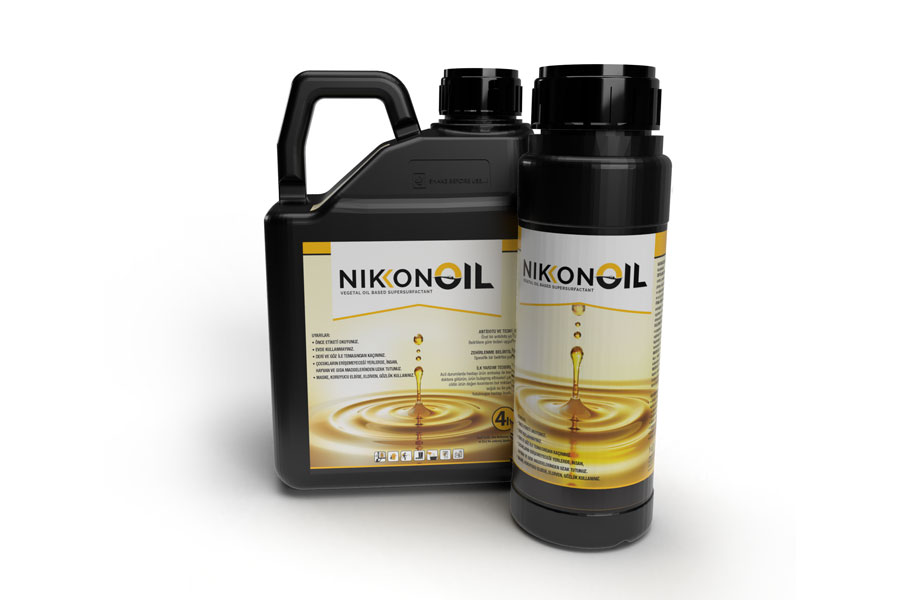
NİKKONOIL®
| PRODUCT NAME | : | NIKKONOIL® |
|---|---|---|
| VEGETAL OIL BASED SUPERSURFACTANT | ||
| PACKAGING | : | 1 & 4 LT |
In agriculture, essential oils are used as an organic and natural approach to control pests. The effects of essential oils on pests can vary depending on the plant species, the type of essential oil and the method of application.
Here are some examples of the effects of essential oils on pests:
Repellent Effect: Some essential oils can keep harmful insects away from plant areas. These oils can protect plants by preventing insects from approaching plants. This effect may be more pronounced in species that are particularly sensitive to the odour of insects.
Killing Effect: Some essential oils can directly kill harmful insects. For example, some essential oils can affect the nervous system of insects and cause their death. However, the certainty of this effect may vary depending on the species and life stage of the insect.
Nutrition and Reproduction Disrupting Effect: Essential oils can disrupt the feeding or reproduction of some insect species. When insects consume plants as food or prefer plants for reproduction, they may change this behaviour due to essential oils.
Molting and Development Inhibitory Effect: Some essential oils can inhibit molting and development of insects. When insects experience unbalanced or abnormal molting, they cannot grow normally and therefore their populations may decrease.
Pheromone Effect: The odours of essential oils can affect the pheromones (communication chemicals) of insects. This can disrupt the normal behaviour of insects, affecting their mating and reproduction processes.
• Caution Keep away from children, pets and food.
• Never exceed the appropriate dosage and use only where necessary.
• Avoid contact with eyes, face and skin.
• In case of contact, rinse with plenty of water.
• Do not exceed the recommended dosage.
• Wash your hands with plenty of water after use.
• Do not use used empty packaging for other purposes.
• Dispose of the packaging after use
• It is recommended to use fertiliser after soil and/or leaf analysis.
STORAGE CONDITION: NİKKON OIL should be stored in its original packaging, tightly closed, away from food, out of the reach of children and animals, in a cool and dry place, under lock and key in an area not exposed to direct sunlight. Under normal storage conditions and if stored unopened in its original packaging, there will be NO change in its physical, chemical and biological properties for at least three years.
COMPANY DECLARATION: We hereby declare that we guarantee the quality of NİKKON OIL provided that it is stored under normal storage conditions and sold in its unopened original packaging, and that we will not accept responsibility for any damage caused by improper storage or improper application and failure to comply with the recommendations.
USAGE METHOD: NİKKON OIL is a high quality spreading adhesive. It is used to ensure homogenous distribution and better adhesion of pesticides on hairy, slippery, rough and difficult to adhere surfaces. In order to obtain good results from spraying, especially with pesticides that have contact (through contact) effect, a good coating, i.e. contact with the entire leaf surface, is required. NİKKON OIL
eliminates the leaf surface tension and ensures homogenous spreading of the pesticide over a wider area on the leaves. Leaves no residue on the product. In hormone use, it increases the effect of the hormone by enabling it to spread over the plant surface.
NİKKON OIL easily mixes with water due to its formulation. If it is to be used with water soluble powder and other drugs, NİKKON OIL should be placed first in the tank half filled with water. If it is to be used with emulsion drugs, NİKKON OIL should be added to the tank after the drug and the tank is filled with water.
POINTS TO BE CONSIDERED WHEN USING AND STORING
- In case of spillage of the product, absorb the product by sprinkling absorbent materials (such as soil) on it, sweep and collect it and bury it in a 50 cm pit to be opened in a place away from the water source, away from people and animals.
- Do not use empty packages for other purposes and dispose of them in accordance with the recommendations.
- Avoid getting the product and packaging into all kinds of water sources.
- After application, remove your clothes and wash your hands and face with plenty of water and soap.
- Observe the protection warnings during application.
- Not harmful to bees.
| WHERE USED | Application DOSE |
|---|---|
| Nar | 400 ml / 100 lt water |
| Hard Stone Fruit Trees | 400 ml / 100 lt water |
| Soft stone fruit trees | 100 ml / 100 lt water |
| Vegetables | 300-400ml /100 litres of water |
| Strawberry | 300-400ml /100 litres of water |
| Olive | 400 ml / 100 lt water |
| Citrus | 400 ml / 100 lt water |

